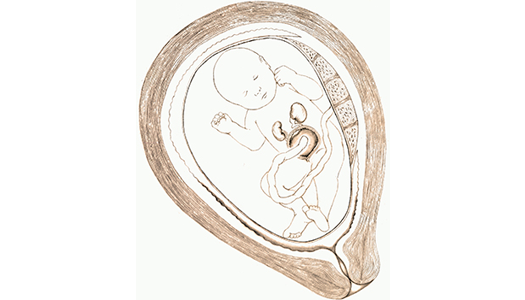Bladder outlet obstruction occurs when the urethra, the tube that carries urine from the bladder out of the body, is too narrow or blocked. This blockage causes urine to back up in the bladder, placing an unborn baby at risk for kidney and lung problems. Bladder outlet obstruction is also known as fetal lower urinary tract obstruction (LUTO).
Bladder Outlet Obstruction Treatment: Why Choose Us?
Doctors at the Fetal Care Center are experts at performing a type of fetal surgery called shunting. They use this procedure to drain the bladder while your unborn baby is still in the womb. Only select fetal centers, such as the Fetal Care Center, have surgeons with the skillset to perform this complex procedure.
About Bladder Outlet Obstruction

Bladder outlet obstruction is rare, affecting approximately 1 out of every 5,000 to 25,000 newborns. Unborn babies with obstructed, or blocked, bladders are at risk for serious health problems, including:
- Kidney damage: The kidneys may not function properly or they may stop working altogether. After birth, some babies experience kidney failure.
- Underdeveloped lungs: Urine from an unborn baby contributes to amniotic fluid, which an unborn baby “breathes” into the lungs like oxygen. When a blockage prevents urination, amniotic fluid levels can get dangerously low and hinder lung development. Some babies’ lungs may be too small for the child to survive after birth.
- Hydronephrosis: Urine builds up in the kidneys due to the bladder blockage.
Causes of Bladder Outlet Obstruction
Bladder outlet obstruction has no known cause. Our genetic counselors can help you understand your future risk of having another child with bladder outlet obstruction.
Diagnosing Bladder Outlet Obstruction
Ultrasound experts at the Fetal Care Center use the most advanced ultrasound technology to diagnose bladder outlet obstruction in unborn babies. Our maternal-fetal medicine specialists are with you during your ultrasounds to immediately discuss treatment options. Our experience performing thousands of these tests every year gives us the expertise to detect problems early.
Learn more about high-risk pregnancy tests.
Treating Bladder Outlet Obstruction
If ultrasound tests confirm bladder outlet obstruction, you undergo regular ultrasound screenings throughout pregnancy. Our specialists use these tests to assess your unborn baby’s bladder size, kidney function and amniotic fluid levels. During pregnancy, you meet with several specialists, including pediatric urologists (urinary tract experts) and pediatric nephrologists (kidney experts).
If your amniotic fluid level is normal, there is usually no reason to treat bladder outlet obstruction before birth. Extremely low amniotic fluid levels can threaten your baby’s life. If this is the case, your doctor may need to perform fetal surgery to place a hollow tube, or shunt, into your baby’s bladder.
The shunt allows the bladder to drain, replenishing amniotic fluid and promoting lung development. Fetal shunting increases the chances of your baby’s survival; however, this condition is sometimes still fatal. Our team has decades of experience performing this highly complex surgical procedure. Learn more about shunting.
We recommend that you deliver at a hospital equipped to care for a high-risk pregnancy, such as the Women & Infants Center. After delivery, your baby may receive advanced medical care in our Level IV newborn intensive care unit (NICU). Our focus is on keeping mom and baby together, which is why our NICU is connected to labor and delivery. Here, your baby receives care from pediatric specialists, including urologists and nephrologists.
Some babies with bladder outlet obstruction experience long-term health problems, such as:
- Poor kidney function, including possible kidney failure
- Kidney and bladder infections
- Abnormal bladder function and urinary leakage
- Difficulty getting adequate nutrition, which may affect growth
- Breathing problems that may require the use of oxygen
The pediatric urology experts at St. Louis Children’s Hospital provide care for children with urinary tract disorders. Learn more about urology services.
Contact Us
To make an appointment with a Washington University fetal care specialist at the Women & Infants Center, call 866.867.3627.